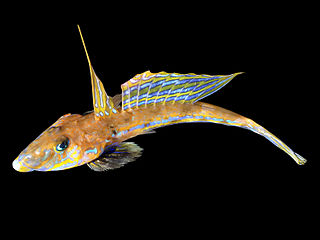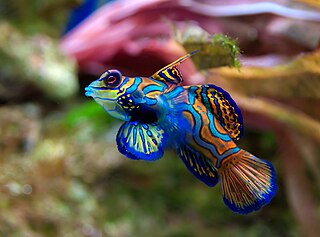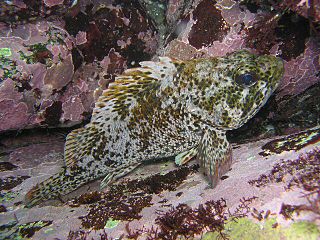| Saurida | |
|---|---|
 | |
| Saurida undosquamis | |
| Scientific classification | |
| Kingdom: | |
| Phylum: | |
| Class: | |
| Order: | |
| Family: | |
| Subfamily: | |
| Genus: | Saurida Valenciennes, 1850 |
Saurida is a genus of fish in the family Synodontidae.
| Saurida | |
|---|---|
 | |
| Saurida undosquamis | |
| Scientific classification | |
| Kingdom: | |
| Phylum: | |
| Class: | |
| Order: | |
| Family: | |
| Subfamily: | |
| Genus: | Saurida Valenciennes, 1850 |
Saurida is a genus of fish in the family Synodontidae.
There are currently 23 recognized species in this genus:

The Synodontidae or lizardfishes are benthic (bottom-dwelling) marine and estuarine bony fishes that belong to the aulopiform fish order, a diverse group of marine ray-finned fish consisting of some 15 extant and several prehistoric families. They are found in tropical and subtropical marine waters throughout the world.
The arrowtooth lizardfish is a lizardfish of the family Synodontidae, found in isolate locations across the southwestern Pacific, at depths of between 9 and 200 m. Its length is between 15 and 28 cm.

The inshore lizardfish is a member of the family Synodontidae found in the western Atlantic.

Synodus is a genus of fish in the family Synodontidae found in Atlantic, Indian, and Pacific Oceans.

The variegated lizardfish is a lizardfish of the family Synodontidae found in the western Pacific and Indian Oceans, at depths from 4 to 90 m. It can reach a maximum length of 40 cm.

Callionymus is a genus of dragonets found mostly in the Indian and Pacific oceans with a few species occurring in the Atlantic Ocean.

Synodus intermedius, the common sand diver, is a species of fish in the lizardfish family, the Synodontidae, a basal ray-finned fish in the class Actinopterygii. Sand divers inhabit subtropical marine ecosystems, (37-17°N), including sandy- bottom areas on continental shelves, coral reefs, estuaries, bays, and reef structures. They are demersal or benthic fish, which means they live on or close to the sea bed. Distribution ranges from the northern Gulf of Mexico south to the Guianas, and western Atlantic north to North Carolina and Bermuda. They are a common lizardfish in the West Indies. They grow to about 40 cm (16 in) total length, and weigh around 1 kg (2.2 lb).
The Wanieso lizardfish(Saurida wanieso) or Wanieso saury, is a species of lizardfish that lives in the Indo-Pacific region.

Saurida undosquamis, the brushtooth lizardfish, large-scale grinner or largescale saury, is a type of lizardfish, a demersal species that occurs in the Eastern Indian Ocean, Malay Peninsula, northern Java, Arafura Sea, Louisiade Archipelago, southern Philippines and northern Australia,. Reports of its occurrence in the Red Sea region and introduction to the Mediterranean are questionable,.
Saurida umeyoshii is a species of lizardfish that lives in the Pacific Ocean.
The shortfin lizardfish(Saurida micropectoralis) is a species of lizardfish that lives mainly off the coast of Japan.
The shortjaw saury(Saurida isarankurai) is a species of lizardfish that lives mainly in the Pacific Ocean.

The smallscale lizardfish(Saurida caribbaea) is a species of lizardfish that lives mainly in the Western Atlantic.

The sand lizardfish, clearfin lizardfish or variegated lizardfish is a species of lizardfish that lives mainly in the Indo-Pacific.

Hapalogenys, the barbeled grunters or velveltchins, is a genus of marine ray-finned fish, it is the only genus in the monotypic family Hapalogenyidae, also spelled Hapalogeniidae. The species of this genus are found in depths between 30 and 230 m in coastal areas and river mouths from the shores of southern Japan to the Bay of Bengal and Northwestern Australia.

Synchiropus is a genus of fish in the family Callionymidae found mainly in the tropical waters of the Indo-Pacific region.

The Indian Scad, also known as the Northern mackerel scad, round scad, Russell's mackerel scad, slender scad or the three lined grunter, is a species of ray-finned fish of the genus Decapterus which is part of the family Carangidae and which occurs in the Indian Ocean. It has colonised the eastern Mediterranean through the Suez Canal. It is an important species in coastal fisheries throughout its range.

Nemipterus is a genus of fish in the family Nemipteridae. They are native to the Indian and Pacific Oceans, but now also occur in the Mediterranean Sea due to Lessepsian migration.

Sebastes pachycephalus is a species of marine ray-finned fish belonging to the subfamily Sebastinae, the rockfishes, part of the family Scorpaenidae. It is found in shallow rocky reefs of Northwest Pacific.

Crenidens crenidens, the karanteen seabream or karanteen, is a species of ray-finned fish from the sea bream family Sparidae which was described by the Swedish zoologist Peter Forsskål in 1775. It is native to the western Indian Ocean but has colonised the eastern Mediterranean Sea since 1970. It is one of only three species in genus Crenidens, the others being the little known Crenidens macracanthus and the partially sympatric C. indicus.